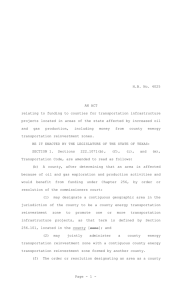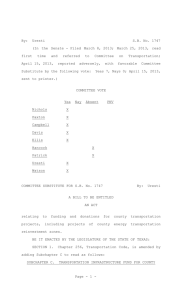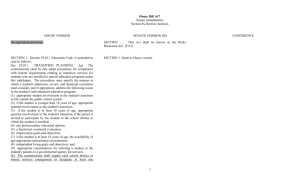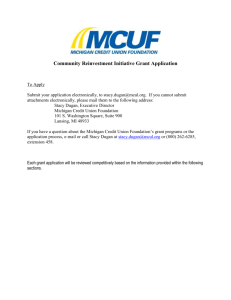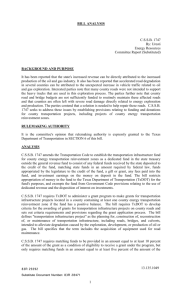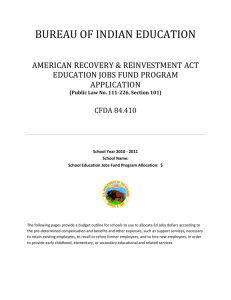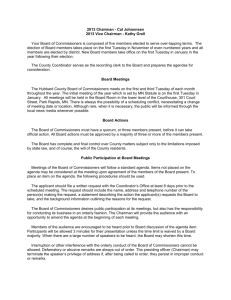HB4025-SAA
advertisement
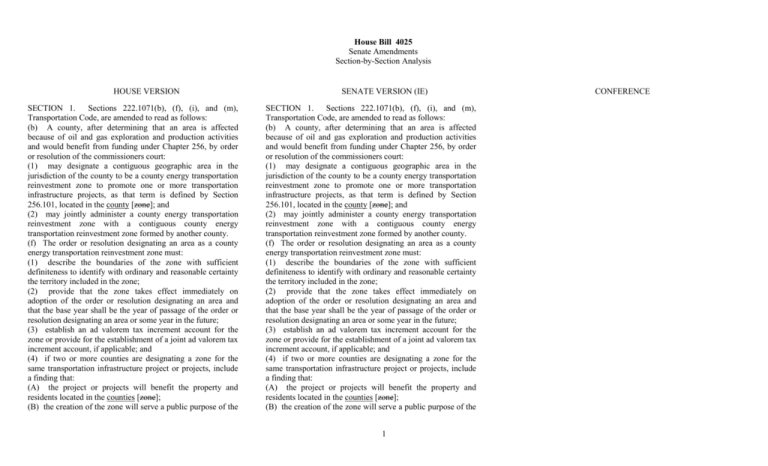
House Bill 4025 Senate Amendments Section-by-Section Analysis HOUSE VERSION SECTION 1. Sections 222.1071(b), (f), (i), and (m), Transportation Code, are amended to read as follows: (b) A county, after determining that an area is affected because of oil and gas exploration and production activities and would benefit from funding under Chapter 256, by order or resolution of the commissioners court: (1) may designate a contiguous geographic area in the jurisdiction of the county to be a county energy transportation reinvestment zone to promote one or more transportation infrastructure projects, as that term is defined by Section 256.101, located in the county [zone]; and (2) may jointly administer a county energy transportation reinvestment zone with a contiguous county energy transportation reinvestment zone formed by another county. (f) The order or resolution designating an area as a county energy transportation reinvestment zone must: (1) describe the boundaries of the zone with sufficient definiteness to identify with ordinary and reasonable certainty the territory included in the zone; (2) provide that the zone takes effect immediately on adoption of the order or resolution designating an area and that the base year shall be the year of passage of the order or resolution designating an area or some year in the future; (3) establish an ad valorem tax increment account for the zone or provide for the establishment of a joint ad valorem tax increment account, if applicable; and (4) if two or more counties are designating a zone for the same transportation infrastructure project or projects, include a finding that: (A) the project or projects will benefit the property and residents located in the counties [zone]; (B) the creation of the zone will serve a public purpose of the SENATE VERSION (IE) SECTION 1. Sections 222.1071(b), (f), (i), and (m), Transportation Code, are amended to read as follows: (b) A county, after determining that an area is affected because of oil and gas exploration and production activities and would benefit from funding under Chapter 256, by order or resolution of the commissioners court: (1) may designate a contiguous geographic area in the jurisdiction of the county to be a county energy transportation reinvestment zone to promote one or more transportation infrastructure projects, as that term is defined by Section 256.101, located in the county [zone]; and (2) may jointly administer a county energy transportation reinvestment zone with a contiguous county energy transportation reinvestment zone formed by another county. (f) The order or resolution designating an area as a county energy transportation reinvestment zone must: (1) describe the boundaries of the zone with sufficient definiteness to identify with ordinary and reasonable certainty the territory included in the zone; (2) provide that the zone takes effect immediately on adoption of the order or resolution designating an area and that the base year shall be the year of passage of the order or resolution designating an area or some year in the future; (3) establish an ad valorem tax increment account for the zone or provide for the establishment of a joint ad valorem tax increment account, if applicable; and (4) if two or more counties are designating a zone for the same transportation infrastructure project or projects, include a finding that: (A) the project or projects will benefit the property and residents located in the counties [zone]; (B) the creation of the zone will serve a public purpose of the 1 CONFERENCE House Bill 4025 Senate Amendments Section-by-Section Analysis HOUSE VERSION SENATE VERSION (IE) county; and (C) details the transportation infrastructure projects for which each county is responsible. (i) The county may: (1) use money in the tax increment account to provide: (A) matching funds under Section 256.105; and (B) funding for one or more transportation infrastructure projects located in the county [zone]; (2) apply for grants under Subchapter C, Chapter 256[, subject to Section 222.1072]; (3) use five percent of any grant distributed to the county under Subchapter C, Chapter 256, for the administration of a county energy transportation reinvestment zone, not to exceed $250,000; (4) enter into an agreement to provide for the joint administration of county energy transportation reinvestment zones if the commissioners court of the county has designated a county energy transportation reinvestment zone under this section for the same transportation infrastructure project or projects as another county commissioners court; and (5) pledge money in the tax increment account to a road utility district formed as provided by Subsection (n). (m) The commissioners court of a county may enter into an agreement with the department to designate a county energy transportation reinvestment zone under this section for a specified transportation infrastructure project involving a state highway located in the county [proposed zone]. county; and (C) details the transportation infrastructure projects for which each county is responsible. (i) The county may: (1) use money in the tax increment account to provide: (A) matching funds under Section 256.105; and (B) funding for one or more transportation infrastructure projects located in the county [zone]; (2) apply for grants under Subchapter C, Chapter 256[, subject to Section 222.1072]; (3) use one [five] percent of any grant distributed to the county under Subchapter C, Chapter 256, for the administration of a county energy transportation reinvestment zone, not to exceed $100,000 [$250,000]; (4) enter into an agreement to provide for the joint administration of county energy transportation reinvestment zones if the commissioners court of the county has designated a county energy transportation reinvestment zone under this section for the same transportation infrastructure project or projects as another county commissioners court; and (5) pledge money in the tax increment account to a road utility district formed as provided by Subsection (n). (m) The commissioners court of a county may enter into an agreement with the department to designate a county energy transportation reinvestment zone under this section for a specified transportation infrastructure project involving a state highway located in the county [proposed zone]. SECTION 2. Section 222.1072(a), Transportation Code, is amended to read as follows: (a) A county may create [is eligible to apply for a grant under SECTION 2. Sections 222.1072(a) and (b), Transportation Code, are amended to read as follows: (a) A county may create [is eligible to apply for a grant under 2 CONFERENCE House Bill 4025 Senate Amendments Section-by-Section Analysis HOUSE VERSION SENATE VERSION (IE) Subchapter C, Chapter 256, if the county creates] an advisory board to advise the county on the establishment, administration, and expenditures of a county energy transportation reinvestment zone. The county commissioners court shall determine the terms and duties of the advisory board members. Subchapter C, Chapter 256, if the county creates] an advisory board to advise the county on the establishment, administration, and expenditures of a county energy transportation reinvestment zone. The county commissioners court shall determine the terms and duties of the advisory board members. (b) Except as provided by Subsection (c), the advisory board of a county energy transportation reinvestment zone consists of the following members appointed by the county judge and approved by the county commissioners court: (1) up to three oil and gas company representatives who perform a company activity or related service [activities in the county and are local taxpayers]; and (2) two public members. No equivalent provision. SECTION 3. Section 251.018, Transportation Code, as added by Chapter 1372 (S.B. 1747), Acts of the 83rd Legislature, Regular Session, 2013, is amended to read as follows: Sec. 251.018. ROAD REPORTS. A road condition report made by a county that is operating under a system of administering county roads under Chapter 252 or a special law, including a report made under Section 251.005, must include the primary cause of any road, culvert, or bridge degradation if reasonably ascertained along with a brief description of the degradation. No equivalent provision. SECTION 4. Sections 256.101(3) and (4), Transportation Code, are amended to read as follows: (3) "Weight tolerance permit" means a permit issued under Section 623.011 for [Chapter 623 authorizing] a vehicle 3 CONFERENCE House Bill 4025 Senate Amendments Section-by-Section Analysis HOUSE VERSION SENATE VERSION (IE) operating specifically in relation to the exploration, development, or production of oil or gas [to exceed maximum legal weight limitations]. (4) "Well completion" means the completion, reentry, or recompletion of a vertical or horizontal [an] oil or gas well. No equivalent provision. SECTION 5. Section 256.103(b), Transportation Code, is amended to read as follows: (b) Grants distributed during a fiscal year must be allocated among counties as follows: (1) 20 percent according to weight tolerance permits, determined by the ratio of weight tolerance permits issued in the preceding fiscal year for the county that designated a county energy transportation reinvestment zone to the total number of weight tolerance permits issued in the state in that fiscal year, as determined by the Texas Department of Motor Vehicles; (2) 20 percent according to oil and gas production taxes, determined by the ratio of oil and gas production taxes collected by the comptroller in the preceding fiscal year in the county that designated a county energy transportation reinvestment zone to the total amount of oil and gas production taxes collected in the state in that fiscal year, as determined by the comptroller; (3) 20 [50] percent according to vertical well completions, determined by the ratio of vertical well completions in the preceding fiscal year in the county that designated a county energy transportation reinvestment zone to the total number of vertical well completions in the state in that fiscal year, as determined by the Railroad Commission of Texas; [and] [FA1(1)] 4 CONFERENCE House Bill 4025 Senate Amendments Section-by-Section Analysis HOUSE VERSION SENATE VERSION (IE) (4) 30 percent according to horizontal well completions, determined by the ratio of horizontal well completions in the preceding fiscal year in the county that designated a county energy transportation reinvestment zone to the total number of horizontal well completions in the state in that fiscal year, as determined by the Railroad Commission of Texas; and [FA1(2)] (5) 10 percent according to the total number [volume] of oil and gas waste disposal wells as defined by the Railroad Commission of Texas [injected], determined by the ratio of the total number [volume] of oil and gas waste disposal wells [injected] in the last full [preceding fiscal] year for which the Railroad Commission of Texas has a report for commercial disposal wells in the county that designated a county energy transportation reinvestment zone to the total number [volume] of oil and gas waste disposal wells [injected] in the state in that [fiscal] year, as determined by the Railroad Commission of Texas. No equivalent provision. SECTION 6. Section 256.106, Transportation Code, is amended to read as follows: Sec. 256.106. PROGRAM ADMINISTRATION. (a) A county that makes a second or subsequent application for a grant from the department under this subchapter must: (1) provide the department with a copy of a report filed under Section 251.018; (2) certify that all previous grants are being spent in accordance with the plan submitted under Section 256.104; [and] (3) provide an update on and brief description of the status of all uncompleted transportation infrastructure projects; and 5 CONFERENCE House Bill 4025 Senate Amendments Section-by-Section Analysis HOUSE VERSION SENATE VERSION (IE) (4) provide an accounting of how previous grants were spent, including any amounts spent on administrative costs. (b) The department may use [one-half of] one percent of the amount deposited into the fund in the preceding fiscal year, not to exceed $500,000 in a state fiscal biennium, to administer this subchapter. SECTION 3. This Act takes effect September 1, 2015. SECTION 7. Same as House version. 6 CONFERENCE
